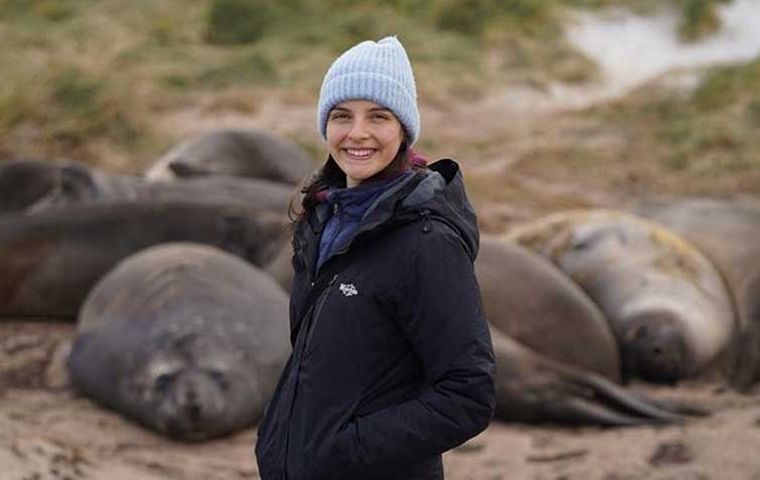MercoPress. South Atlantic News Agency
Tales from the Southern Seas: A Uruguayan in the Falklands
 Bettina among a resting pack of Falklands marine mammals
Bettina among a resting pack of Falklands marine mammals Bettina Alberti Arriaga, who was the student competition winner from Uruguay, has published an article about her visit to the Falkland Islands.
For several years now the Falkland Islands Government organizes a regional student competition. Participants from four countries, Argentina, Chile, Paraguay and Uruguay are asked to submit a short video in English, in which they answered the question: “Why would I like to meet my neighbors in the Falkland Islands?”.
More than 100 students entered the competition. All entries were reviewed and representatives from the Falkland Islands Government and British Embassies of the four countries selected the winners. The prize is a full week in the Falklands living with a local family and complying with an agenda of meetings, interviews and visits.
We hope you enjoy reading the piece written by the representative from Uruguay, Bettina, and if you want to find out more about her trip, Betti has been developing 'The Falklands Chronicles' on her Instagram account, @bettyalbertii.
It's a truth universally acknowledged for anyone living in the Falkland Islands that it's “better to layer up than to layer down.” That's one of the first lessons I learned during my unforgettable week-long journey to the Islands, thanks to the program “Why would I like to meet my neighbors in the Falkland Islands?” Even in summer, the weather can be unpredictable, making layered clothing the most appropriate choice to handle the “four seasons in one day” phenomenon.
The Falkland Islands are home to around 3600 people, many of them immigrants from over 60 countries. Upon our arrival, we discovered that the Islands are also home to families who have been a part of the Falklands for centuries. In fact, it's common for them to keep track of how many generations ago their first ancestor settled on the Islands (generally, but not exclusively, from the UK).
Life in the capital Stanley is full of surprises for newcomers. Especially from this side of the continent, one of the first things you'll notice is the city's strong commitment to safety. Additionally, you'll hardly come across small cars on the streets; islanders love their 4x4s, perfect for navigating the bumpy roads leading to the Camp. As for driving, can we take a second to praise the driving-waving system of the Falklands? Anyone you run into during a car journey will receive one of two signals: a greeting by raising one or two fingers from the steering wheel (if it's a stranger) or a fully raised hand from the wheel to wave at familiar faces.
When you arrive in the Islands, you might learn some new words as well. Especially those related to food! “Smoko” or “Diddle Dee” are a couple of them. You might also discover that, after years of studying English as a second language, “dinner” might not only mean the last meal of the day but also a synonym for “lunch” (especially for the older islanders). You could also end up “wind-burnt,” so it's better to use proper protection!
During our visit, we had the opportunity to meet three Members of the Legislative Assembly. MLAs Leona Roberts, Jack Ford, and Roger Spink kindly answered our questions regarding the administrative and power structures in the Falklands. From this conversation, we learned that a total of 8 MLAs are elected by the islanders (and anyone with “status”) to take charge of the local government. Once elected, the MLAs decide which portfolio (equivalent to our ministries) each will handle. What's peculiar? There are no political parties. Anyone over 18 and registered on the electoral roll can run and be elected as many times as the citizens decide.
Furthermore, we had the honor of meeting the first female Governor of the Falkland Islands, Alison Blake, and her husband, Peter Henry. They kindly welcomed us into Government House to share some curiosities about the building. Did you know that the last time the billiard table at Government House was used was during a visit by the British Ambassador to Uruguay, Faye O'Connor? Interestingly, it wasn't Ambassador O'Connor but her young son who won a match against the governor's husband.
Nevertheless, the bonds connecting the Islands and Uruguay go much deeper. Many of the fruits and vegetables available in Stanley are exported from our country. Moreover, for several years, young islanders were sent to Montevideo (or “Monte,” as some warmly call our capital) to further their education. I learned this firsthand from Ailsa Heathman, whose mother studied in our country in the 1940s and maintained friendships with Uruguayan classmates throughout her life. Besides, Uruguay is well-known on the Islands thanks to the medical care offered to islanders at the British Hospital or the “Expo Prado”, an annual event that brings together several visitors from the Falklands.
Finally, what stands out most about my experience in the Falkland Islands is the warmth of its people. Both my wonderful travel friends (students from Paraguay, Argentina, and Chile) and I were warmly welcomed by loving host families (special mention to the Murphys!) who showed us the most beautiful comers of Stanley while making us part of their day-to-day life. To them and those responsible for organizing this program, my deepest gratitude.
I won't reveal more; now it's your turn to be amazed by our neighbors in the Falkland Islands




Top Comments
Disclaimer & comment rulesCommenting for this story is now closed.
If you have a Facebook account, become a fan and comment on our Facebook Page!